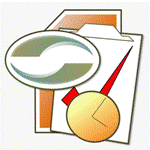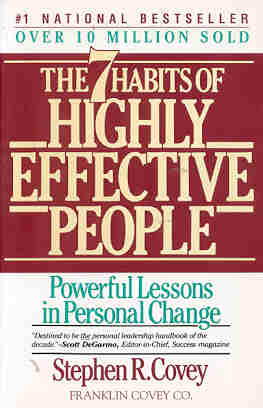Covey's Seven Habits Celebrates it's 20th Anniversary - My Journey
Summary
- Five lessons learned: use 360 reviews, goals apply to your whole life, connect daily tasks to your goals, think win/win doesn't apply to every interaction, block time to sharpen the saw.
- Engineers (technical types) have a difficult time with the soft skills, i.e. there are soft skills?
- Self reflection and growth only comes when you're ready to hear it. Just like many programs, you can't work on something until you admit that it's an issue.
- A personal mission statement is the foundation upon which all decisions and actions are based.
Covey's Seven Habits Turns 20 Years Old in 2009
In 1989, Free Press, a division of Simon and Schuster, published the first copy of Stephen Covey's Seven Habits of Highly Effective People, Restoring the Character Ethic. After several years of studying leadership and completing a literature scan of some 200 years of the leadership genre, Covey discovered a critical shift from character based to personality based advice and direction. His new book, the Seven Habits, was an attempt to restore focus on what makes us who we are versus simplying trying to act our way into a new paradigm.
Beginning my 7 Habits Journey
Three years after the Seven Habits hit the book shelves, at the ripe old age of 29, my new bride suggested that I read Covey's book. At this point, it's important to point out that I am an engineering graduate and for anyone who knows a newly minted engineer, they also know that we can be a very arrogant bunch. So it was with great skepticism that I picked up this book the first time. After all, I thought engineering school taught me all I needed to know to solve problems.
But being a good husband and promising to read the book, I did. And I remember my first reaction to Covey's work-- wouldn't it be great if everyone I worked with picked up these habits, I wouldn't have any more 'people' problems getting in the way of solving the important business problems. Can you see the arrogance shining through? Clearly I had a lot more to learn.
A few years and a number of humbling experiences later, I picked up Covey's book again. This time I had a completely different perspective. I remember thinking how depressed I was because I embraced so few of the habits.
Sure I had goals and almost always began with the end in mind, but being proactive, i.e. thinking about the space between stimulus and response, not often. First things first, I had some view of it, but I certainly didn't practice it everyday. Think win/win - hardly ever, I mostly thought Win. That attitude got me through school successfully, why shouldn't it work in the workplace? Seek first to understand then to be understood, not at NCR where I started my career - whoever could express their opinion the strongest usually carried the day. Synergy happened rarely and only opportunistically. And when you're in your twenties, at least for me, I didn't think much about sharpening the saw, I thought I had a pretty sharp saw to begin with.
All of these realizations came in cascading waves and it was very clear to me, if I didn't evaluate how I thought about my relationship with myself and others that I interacted with, I was headed for a pretty sharp fall.
Discovering My Mission Statement
I used to travel frequently, which afforded me large stretches of time on airplanes. Remembering that this was the early 90s, before mobile phones were prevalent, before the internet and before the iPod, my favorite use of that time was reading and/or catching up on work. It was the perfect time for self-reflection, my first step was to discover my personal mission statement.
I use the word "discover" deliberately - I think we all have a personal mission statement that we're operating against, however, we frequently don't write it down. Which means our mission is something happening to us versus something that we make happen. Reflecting on the first habit, the best favor you can do for yourself is to get clear on your mission because that's what drives every decision you make everyday.
In the spirt of shared learning - here's my personal mission statement:
My mission is to live with integrity and to make a positive difference in the lives of others.
My values are:
- Honesty - I am honest, what I do speaks volumes. I encourage people to evaluate my character by my actions and I strive to make sure what I say is consistent with the way I act.
- Respect - I am respectful. I listen NOT with the intent to respond but to deeply understand what it is a person is expressing to me. I work at reflecting what I hear so that the person feels heard and we can use that to establish common ground.
- Inspiration - I inspire. I teach by example using the vocabulary that is best understood by those I’m working with. I teach that each of us have choices that shape us in our own minds and in the minds of others.
- Courage - I am courageous. I speak my view respectfully. I do not shrink from conflict and I am not shy about what I think. As we debate or disagree, I will conduct myself according to my values and I will value those around me.
- Learning - I am a lifelong student. I learn from my mistakes, make adjustments and share my knowledge with all that are interested.
Five Key Learnings Along the Way
Here are five things I've learned along the way.
- 360 Degree Feedback (Habit 1) - You can only see what's in front of you, or to better use Donald Rumsfeld's attempt at explaining this; We know what we know, we know what people tell us, but we don't know what people don't tell us. The 360 review process is a great way to identify areas of our character that would be well served to receive our focus. I've done this a few times and every time it's been well worth the effort.
- Setting Goals (Habit 2) - We do a pretty good job of setting goals professionally, however, we often forget that we only have 100% of ourselves to give to all of the communities that have expectations for us, i.e. professional, family, society and ourselves. It's important to articulate goals in each of these areas so that we can manage our time and energy accordingly and not get overwhelmed by one or more of these communities.
- Getting Things Done (Habit 3) - I've found the combination of the Seven Habits and David Allen's Getting Things Done helps to create daily focus on what matters most. The glue that connects these two schools of thought are the concepts of goals and projects. Connecting your every day transactions, such as email, mail, meeting notes, and conversations into a trusted management system that keeps track of your projects helps you stay focused hour by hour, assuring you're focusing on what matters most. Ceptara's Personal Excellence Workshop covers this topic in detail and we're working on an Outlook Add-in that introduces the notion of a project into Outlook so that you can align your daily work to your goals and projects.
- A Collaborative Attitude (Habit 4) - If you have a mountain of patience you can make one-sided 'Think Win/Win' work. But you have to invest a lot of your energy and time. It is absolutely true, you cannot be efficient with people. When considering Think Win/Win or No Deal, there are situations where 'No Deal' is the proper course of action. Often we need to move on if working on Win/Win is extracting more from you than the value of making it work. A good example of that is working for a company that doesn't share or align with your personal value system.
- Sharpening the Saw (Habit 7) - Build this into your day, if you don't block time on your calendar for you, it definitely won't happen, and sometimes it still doesn't happen because we sacrifice that time for other purposes. My advice, be stingy with that time. The world will not come to an end if you spend 30 minutes reading, or take an extra 45 minutes at lunch for a run. You are on this earth for about 80 years, take care of the machine that enables you to enjoy it.
What's Next? Practice, Practice, Practice.
Practicing the habits, as with practicing anything, can help you achieve a level of mastery. However, even the most accomplished musicians will tell you that they never stop practicing and learning new things. I feel the same way about mastering the journey to interdependence.
I've read the 8th habit and resonate with "finding your voice to help others find theirs." And I think about the literature as I mentor and lead others. Teaching others does have a profound effect on how you personally understand a topic.
My next challenge, and one that I practice everyday, is staying true to my goals in my every day actions. For example, not letting email distract me from what is truly important to execute. That's why I use our Add-in, so that I can process my collection points (email, meetings, phone calls, etc) into tasks, assign them to a project, block time on my calendar to act, plan weekly and daily with the help of the Organizer pane, and use the timecard capability to assess my progress in achieving my objectives.
What have you learned from Stephen Covey?
It's been nearly 20 years for me practicing the Seven Habits and as you can see there have great learning moments that have shaped my journey. I'm always interested in what others have learned or their great challenges, so please comment and contribute to the conversation, perhaps we can learn from each other.
Recent Updates
Microsoft Outlook Add-In

Focus on Your Life, Not Your Inbox
Achieve greater focus by shifting your attention from e-mail to accomplishing what matters most!
Company News
Stay up to date with our newsletter!




Comments
My Favorite of the Seven
My favorite of Covey's seven habits is "Begin with the end in mind." It is pervasive in my life, both personal an professional. In a very real fashion, this habit convesy the essence of process management. After all, the best processes are designed to deliver high quality, high value outcomes (the end). And, the design effort needs to be focused on these outcomes in order to yield the activities and tasks that can repeatedly deliver them. This is also true of projects and organizations, both in the design and management.